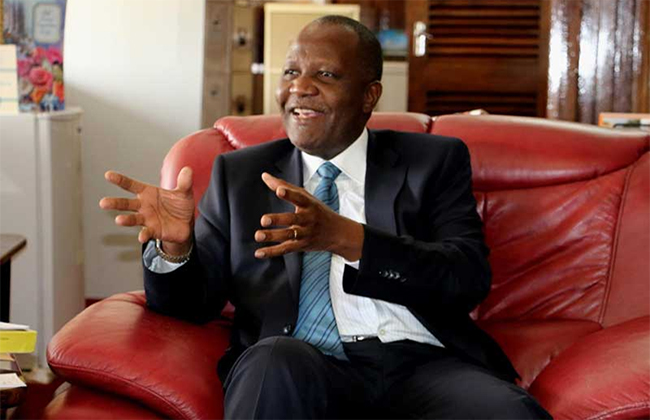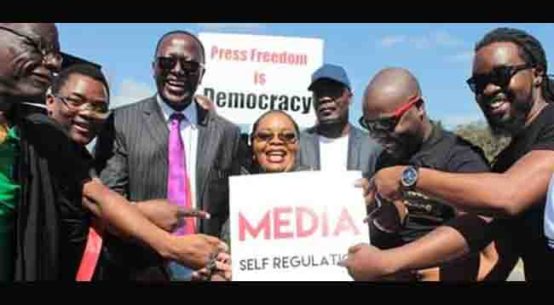
It came hastily barely months before Presidential and general elections in Zambia, arguably to stifle press and other freedoms and civil liberties, but the new Government believes its enactment was not done in good faith as it segregates some sections of society, media and some politicians.
Technology and Science Minister Felix Mutati notes that while the Cyber Security and Cyber Crimes Act of 2021 may have had good intentions, it had affected the enjoyment of the people’s liberties, including heightening cases of gender based violence. It further stifles the internet’s full use as a tool for development.
Launching the report on understanding Online Gender Based Violence in Southern Africa that his ministry is revising, the Act minister Mutati noted the call for a reflection on the Act and that within the space of the internet some elements of inequality had become rife.
A category of women, politicians and female media personnel are now more vulnerable to online gender based violence an act perpetuated hence the need for the country to redress, a call for comprehensive stakeholder participation.
The stakeholders submissions, once the review is facilitated at policy level, will filter into the revision of the Cyber Security and Cyber Crimes Act of 2021 and help streamline it.
On 24 March last year Zambia’s Parliament enacted the Cyber Security and Cyber Crimes Act No. 2 of 2021, a law that provides, among other things; the establishment of the Zambia Computer Incidence Response Team and the National Cyber Security Advisory and Coordinating Council.
Other authorities under the Act provide for the protection of individuals against cyber crime, including child online protection; and the facilitation of the identification, declaration, and protection of critical information infrastructure.
The Cyber Security and Cyber Crimes Act entered into force on 1 April 2021.
The enactment of the Act sent chilling effects on various interest groups, the media, and civil society right campaigners as it came amid President Edgar Lungu’s threats that the Act could be a weapon to deal with social media abusers.
Social media should not be used to promote violence, abuse innocent people and propagate insults against government officials. The USA has demonstrated to the world that those who abuse social media can be stopped, he had argued.
“Here is the good news for social media abusers. The Cabinet is introducing a bill in parliament called the Cyber security and Cybercrimes Bill. This Bill aimed at protecting persons from cybercrime will not let you go Scott-free if you do not stop abusing innocent people online. In the coming days, all those abusing social media will be arrested ,” Lungu warned.
The Zambia Information and Communications Technology Authority (ZICTA) has been directed to put a stop to irresponsible use of social media platforms and ensure that only those who use social media for the good of society are allowed to continue using it.
However, interest groups-media, civil society, embassies accredited to Zambia and other players frowned at the unilateral action by the government with some petitioning the Zambian court, describing the Act inimical to the country’s democratic tenets.
The Collaboration on International ICT Policy in East and Southern Africa (CIPESA), established in 2004 and one of two centres established under the Catalysing Access to Information was critical to the action. The Act in its current form stifles some solutions to emerging challenges in the digital space.
It could if promoted have wide negative impacts on the protection, promotion and enjoyment of digital rights and freedoms.
It argued Zambia’ cyber law falls short of the established regional and international human rights standards on the right to privacy as laid down in various statutes including the African Union Convention on Cyber Security and Personal Data Protection.
Zambian Parliament contended in its report that the Act be repealing or amending the regressive provisions to ensure the protection of digital rights and freedoms. Short of this, the new law could only serve the purpose of handing enemies of democracy yet another weapon for silencing the legitimate expression of critics, political opponents, and ordinary citizens.
The Amnesty International, another US based human rights defender observed that the Act in Zambia could increase repressing the exercise of civic rights, a trend that is growing as the country as it came on the heels of the 12 August poll.
Other human rights defenders are equally worried that state agencies could apply the recently enacted Cyber Security and Cyber Crimes Act 2021 to further undermine the digital civic space. The Bloggers of Zambia claimed during 2020 seven people had been arrested under the Criminal Procedure Code.
This was on account of purportedly defaming the president through posts on social media. A 2020 report by Citizen Lab, a global digital rights watchdog, identified Zambia as a possible customer of cyber espionage software.
The Media Institute of Southern Africa-a press freedom watchdog in the eight-member regional grouping developed goose pimples warning that the enactment of the Cyber Security and Cyber Crimes Act could frustrate the much espoused freedom of expression, media freedom and Zambians’ right to privacy.
“The Act falls far short of regional and international standards and instruments on human rights such as the African Union Convention on Cyber Security and Personal Data Protection (Malabo Convention.
This sets the standards for cyber security and personal data protection laws as well as capacity building, knowledge exchanges and experience sharing among signatories.” it said in a communiqué.
Freedom House, a US-based human right campaigner-ranked Zambia’s state of internet freedom in 2020 as “partly free,” citing network restrictions, arrest of pro-government commentators and online users. And with the recent enactment of the cyber crimes law, worries are growing that the government could employ it as yet another weapon to silence dissenters and critics.
A SADC meeting held in 2020 had resolved to “take pre-emptive measures against external interference, the impact of fake news and abuse of social media particularly in electoral processes, hence heightening concerns.
Notably, the law was passed amidst criticism that it was primarily aimed at policing cyber space and gagging freedom of expression and speech of government critics and opponents ahead of the August 12, 2021 general election. The government had hastily passed the law after rejecting concerns raised by civil society about its regressive provisions.
Zambian civil right campaigners sought the High Court’s interpretation of the law, pointing fingers at the government of violating the Constitution through the enactment of the Cyber Security and Cyber Crimes Act.
The civil right campaigners argue that the new law contains provisions that threaten the right to protection of the law and the right to freedom of expression, among other constitutionally guaranteed rights demanded the Cyber Security and Cyber Crimes Act to be declared unconstitutional.
Arguably, the law in its form among others seeks to promote the “responsible use of social media platforms”. It allows the government to listen to people’s conversations without a court order. It compels service providers to provide services that are “capable of rendering real-time and full-time monitoring facilities for the interception of communications”.
This will be done through the setting up of a Central Monitoring and Coordination Centre through which intercepted communication and call-related information will be forwarded.
But the Zambia’s government brushed aside the accusations. It argued the country has a vibrant civil society, a thriving independent media, and an impartial judiciary that protects civil liberties.




